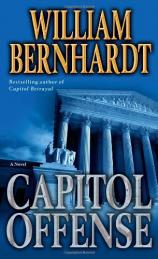Capitol Offense
Review
Capitol Offense
Professor Dennis Thomas has been pushed to the limits of his
sanity --- or maybe beyond. At least that’s what he wants a
jury to believe. You see, he stands accused of killing Tulsa Police
Detective Christopher Sentz. If you can believe it, he even sought
the counsel of an attorney before the murder, inquiring about how
to get away with it.
But first, let’s back up a little. When Thomas’s
wife, Joslyn, an oncology doctor at an eminent Tulsa hospital,
doesn’t make it home after work one night, Thomas becomes
frantic. Something must be terribly wrong, he believes. He is
panicked and spends every waking hour looking for her. And when
he’s not out searching for Joslyn, he’s at the police
station, pleading with the cops --- specifically Sentz --- to open
an investigation into her disappearance. As Sentz continues to
refuse time after time, Thomas grows increasingly incensed. He is
sleep-deprived, worried sick about Joslyn, and angry as hell that
the police will not help.
Eventually, the truth about Joslyn’s disappearance is
discovered: she had been in an accident, trapped in her car,
suffering, for a full week. She did not make it out alive. In this
moment, Thomas loses not only his wife but his sanity as well. His
grief, coupled with his frustration, sends him over the edge. He
tries to attack Sentz, accusing him of murdering Joslyn. While he
gets little satisfaction for his effort, he does receive a few
nights in the local jail.
By now, most of us can sympathize with his situation:
we’ve all felt that desire for revenge at one point in our
lives. But it runs much deeper for Thomas at this point. He is
driven by raw anguish and is seeking a way to settle the
score…an eye for an eye as it were. He decides to enter the
office of Senator Ben Kincaid, an attorney tending his law practice
back home in Tulsa while there is a recess in Washington.
Naturally, Kincaid declines to advise Thomas on ways to avoid
prosecution if he were arrested on charges for a murder yet to be
committed.
However, Thomas goes through with his plan to murder the
neglectful detective and is soon arrested. Thomas claims innocence
and begs Kincaid to represent him; against his better judgment,
Kincaid takes the case. There is just something about Thomas that
tugs at Kincaid’s heartstrings. But now, Kincaid has an
impossible case, one that he cannot imaginably win, at least by
conventional methods. It occurs to him that they have one hope:
pleading temporary insanity, which will elevate the chances of
winning from totally impossible to highly improbable. It is their
only shot.
Meanwhile, the District Attorney is up for reelection, giving
him a lot of incentive to win the case. Besides, cop killers are
particularly odious human beings, especially in Oklahoma. No one
likes them, not even in prison. Thomas’s future looks mighty
bleak. To add to an already wretched outlook, the judge they will
be trying the case before is about as unsympathetic a man as they
could have found. He will make their lives more miserable than they
already are.
Author William Bernhardt is a master at courtroom suspense. He
puts witnesses on the stand, and the DA grills them to a charred
finish. It looks like the defense doesn’t have a chance.
But as we all know, juries are unpredictable. Anything can happen
during the course of a trial. And in CAPITOL OFFENSE, it does. The
book has more twists and turns than a roller coaster and will keep
you guessing the whole way through. Highly recommended.
Reviewed by Kate Ayers on December 26, 2010





